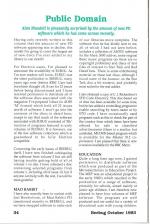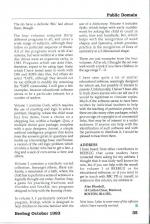Alan Blundell is pleasantly surprised by the amount of new PD software which he has come across recently.
Public Domain
Having only recently written in this column that the amount of new PD software appearing was in decline, this month I'm going to cover the largest set of new discs I've ever added to my library in one month!
For Electron users, I'm pleased to announce the availability of ELBUG. As I'm sure readers will know, ELBUG was the sister publication to Beebug, many years ago now (before RISC User had even been thought of). It ran for 22 issues before being discontinued and I have received permission to distribute all of the software discs associated with the magazine. I've prepared 3 discs (in ADFS 'M' format) which hold all 22 issues worth of software. I won't go into the contents of the discs in detail here, except to say that much of the software associated with ELBUG consisted of 'Elk' versions of programs featured in early volumes of Beebug. It is however, one of the few software collections which is guaranteed to be fully Electron compatible.
Concerning the early issues of Beebug itself, I have now finished cataloguing the software from volume 2 but am still having trouble getting hold of all of volume 1 on disc. I have collected a disc containing selected programs from volume 1, including all of issue 10, but if anyone can help with the rest, I would be most grateful.
Mad Rabbit
I have also recently been in contact with Joel Rowbottom, of Mad Rabbit PD (mentioned recently in Beebug), and we have swapped software to make each of our libraries more complete. The software that he has kindly sent to me, all of which I had not seen before, includes a collection of AMPLE software for the Music 5000 add-on, some original Basic music programs (so there are no copyright problems) and discs of text files of interest to Star Trek and Red Dwarf fans. There is some entertaining material on these last discs, although I found some of the humour on the Star Trek disc a bit esoteric, and probably most suited to the real addict.
I also obtained a copy of C. J. Richardson's STD Code Directory. This disc-based set of data has been available for some time, but he has added a controlling program to enable searching by town name or by STD code. I have occasionally used programs such as this to check the part of the country from which items have been offered for sale in classified advertisements (there is a similar, but unrelated, MS DOS based program which is available for the Master 512 co-processor). I am pleased that there is now a version available for the BBC Micro.
Education
Quite a long time ago now, I gained permission to distribute software which was produced as part of the Microelectronics In Education Project.
The MEP was an educational project in the early 1980's which resulted in the production of a range of software, primarily for schools, aimed mainly at junior age children. I am therefore now pleased to have four volumes of MEP software. The programs are well produced and are useful for a variety of educational uses with young children. The do have a definite "80s" feel about them, though.
The four volumes comprise thirty different programs in all, and cover a wide range of subjects, although they follow no particular sequence or theme. All of the programs work with disc systems, but were written at a time when disc drives were an expensive rarity, in 1983. Programs which use data files, therefore, expect to be using tape. Some which I have tested seem to work with DFS and ADFS data files, but others do select *TAPE, although they should not be too difficult to modify (by removing the *TAPE commands). I will give a few examples, because educational software seems to be a particular interest for a number of readers.
Volume 1 contains Crash, which requires the use of counting and logic to solve a problem; Shopping, where the child must buy five items, from a choice on a shopping list, within a budget; Quiz, a multiple choice quiz package, complete with a quiz designer; Animal, a simple artificial intelligence program that learns from the answers given to questions and builds up a knowledge base, and Farmer, a version of the old logic problem which involves a farmer who has to get a hen, a dog and a sack of corn across a river; and others.
Volume 2 contains a similarly varied collection. Amongst others, there are: Eureka, a simulation of a bath, where the child has to perform a series of actions in a logically thought out order; Fraction Snap, a game for practising fractions; and VennMan and VennKid, two programs designed to help with the learning of sets.
In volume 3, I particularly noticed the program, Brickup, which is designed to help children to become familiar with the use of a dictionary. Volume 4 includes Spike, which helps with early number work by asking the child to count in units, tens and hundreds; Box, which helps with the recognition of word shapes; and Symmetry, which provides practice in the recognition of lines of symmetry in a 2 dimensional shape.
These are just examples from the four volumes. All in all, I thought the set was well worth a look if you have children in the age range 7 - 11.
I have seen quite a lot of similar educational software, seemingly designed for school use, but possibly of interest to parents. Unfortunately, I haven't been able to track down anyone who can tell me if it would be legitimate to circulate copies. Much of the software seems to have been written by individual teachers to help with the teaching of particular points, but there are also many other packages, which give no sign of copyright or of commercial links, that may be of interest to a wider audience. If anyone can help with the identification of such software and with the permission to distribute it, I would be pleased to hear from them.
Address
I have heard from other contributors to Beebug that some readers have contacted them asking for my address. I thought that it was fairly well known by now, but if you can help with the search for volume 1 of Beebug or for educational software, or if you want to get in touch with BBC PD or myself, in relation to this column, my address is:
Alan Blundell 18 Carlton Close Blackrod, BOLTON, BL6 5DL
Next issue, I plan to cover more of the software which I have recently received.
This article was converted to a web page from the following pages of Beebug Volume 12 Number 5.


 1st October 1993
1st October 1993

